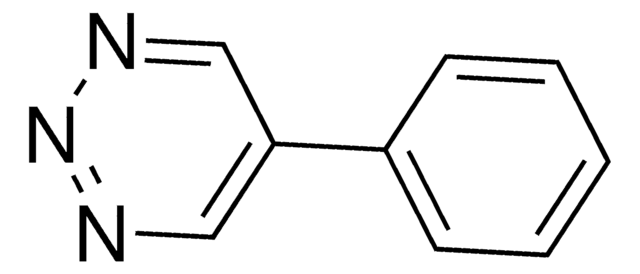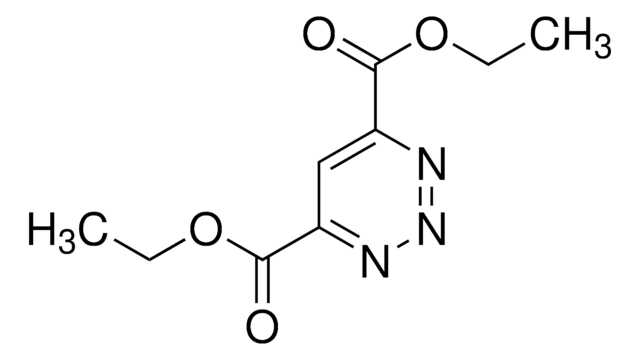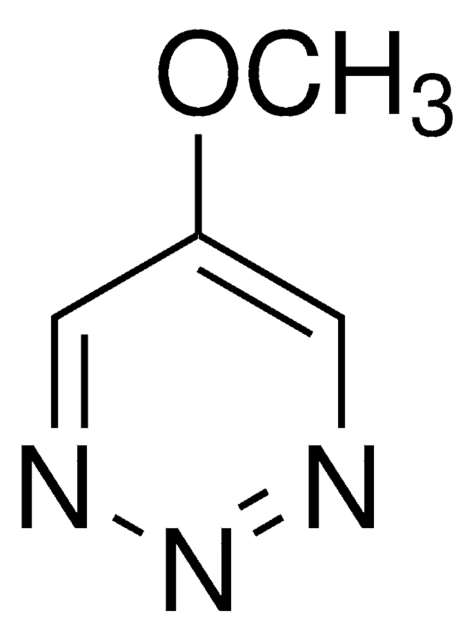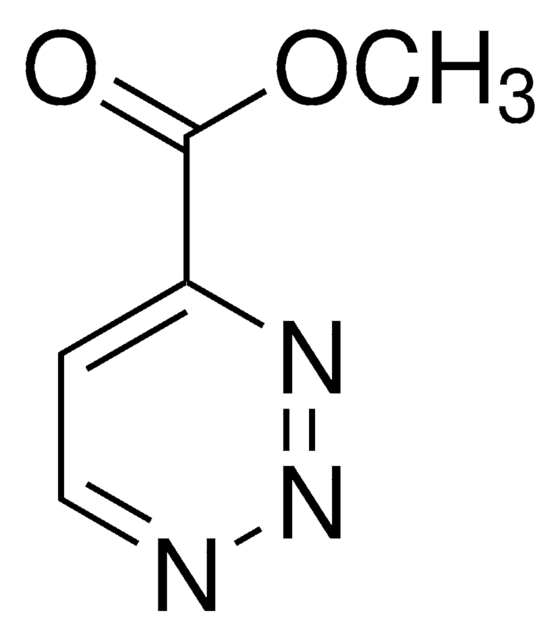ALD00112
1,2,3-Triazine
≥95%
Synonym(s):
1,2,3-Triazabenzene
Sign Into View Organizational & Contract Pricing
All Photos(1)
About This Item
Empirical Formula (Hill Notation):
C3H3N3
CAS Number:
Molecular Weight:
81.08
MDL number:
UNSPSC Code:
12352100
PubChem Substance ID:
Recommended Products
Quality Level
Assay
≥95%
form
solid
storage temp.
−20°C
SMILES string
C1=CN=NN=C1
InChI
1S/C3H3N3/c1-2-4-6-5-3-1/h1-3H
InChI key
JYEUMXHLPRZUAT-UHFFFAOYSA-N
Application
1,2,3-Triazines have been shown to be reactive substrates in inverse electron demand Diels-Alder strategies. Recent examples by the Boger Research Group have utilized this reactive motif in the construction of highly functionalized N-containing heterocycles.
Signal Word
Warning
Hazard Statements
Precautionary Statements
Hazard Classifications
Acute Tox. 4 Oral - Eye Irrit. 2 - Skin Irrit. 2 - STOT SE 3
Target Organs
Respiratory system
Storage Class Code
11 - Combustible Solids
WGK
WGK 3
Flash Point(F)
Not applicable
Flash Point(C)
Not applicable
Choose from one of the most recent versions:
Certificates of Analysis (COA)
Lot/Batch Number
Don't see the Right Version?
If you require a particular version, you can look up a specific certificate by the Lot or Batch number.
Already Own This Product?
Find documentation for the products that you have recently purchased in the Document Library.
Customers Also Viewed
Nabih Lolak et al.
Journal of enzyme inhibition and medicinal chemistry, 35(1), 424-431 (2020-01-05)
A series of 16 novel benzenesulfonamides incorporating 1,3,5-triazine moieties substituted with aromatic amines, dimethylamine, morpholine and piperidine were investigated. These compounds were assayed for antioxidant properties by using 1,1-diphenyl-2-picrylhydrazyl (DPPH) radical scavenging assay, 2,2`-azino-bis(3-ethylbenzothiazoline-6-sulfonic acid (ABTS) radical decolarisation assay and
Cécile Chevrier et al.
Environmental health perspectives, 119(7), 1034-1041 (2011-03-04)
Despite evidence of atrazine toxicity in developing organisms from experimental studies, few studies--and fewer epidemiologic investigations--have examined the potential effects of prenatal exposure. We assessed the association between adverse birth outcomes and urinary biomarkers of prenatal atrazine exposure, while taking
Geaneth Pertunia Mashile et al.
Molecules (Basel, Switzerland), 23(6) (2018-06-16)
In this study, a simple, rapid and effective in-syringe micro-solid phase extraction (MSPE) method was developed for the separation and preconcetration of parabens (methyl, ethyl, propyl and butyl paraben) in environmental water samples. The parabens were determined and quantified using
Maya D Lambreva et al.
PloS one, 8(4), e61851-e61851 (2013-04-25)
This study was prompted by increasing concerns about ecological damage and human health threats derived by persistent contamination of water and soil with herbicides, and emerging of bio-sensing technology as powerful, fast and efficient tool for the identification of such
Beatrice Falcinelli et al.
Plant foods for human nutrition (Dordrecht, Netherlands), 72(4), 432-438 (2017-11-04)
Pomegranate (Punica granatum L.) fruits are used mainly by the juice industry, for which seeds are a by-product to be disposed of, though they could potentially be a source of bioactive compounds. In this work, germination (total germination percentage, G;
Our team of scientists has experience in all areas of research including Life Science, Material Science, Chemical Synthesis, Chromatography, Analytical and many others.
Contact Technical Service











